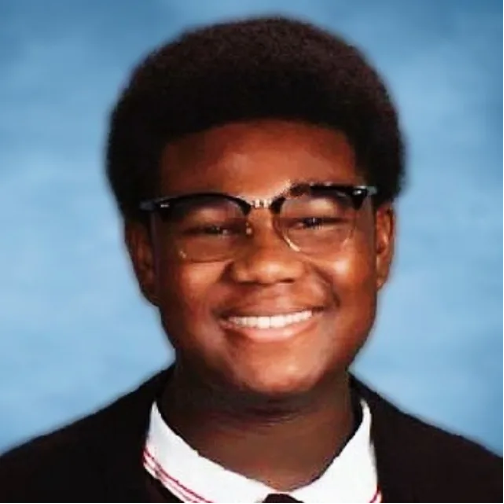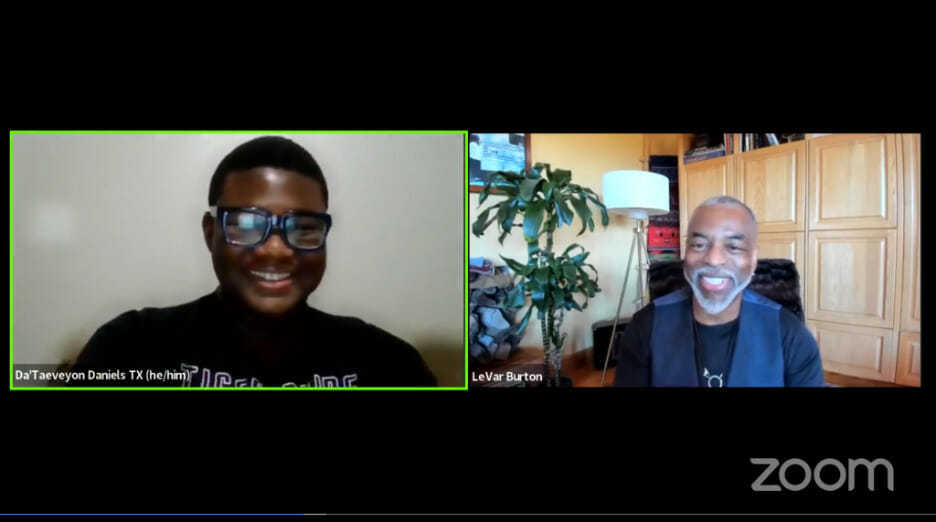By Jae Moore
The name LeVar Burton should ring familiar to anyone who grew up in the ‘80s or ‘90s. As host and executive producer of the award-winning PBS series Reading Rainbow, Burton instilled an unquenchable love for learning in countless children. And now, Burton has taken on a new role: Honorary Chair of Banned Books Week 2023. It’s a fitting recognition for a literary advocate who spent decades encouraging kids to read, and who uses his celebrity to fight for their right to continue to do so as shown by his aptly named new documentary (The Right to Read) and his collaboration with MoveOn to collect signatures from notable figures, Artists Against Book Bans.

LeVar Burton released a new original T-shirt to support the fight against book bans
Dubbing October 4 “LeVar Burton Day,” Banned Books Week hosted a live conversation between Burton and a rising star in the effort to end book bans, Da’Taeveyon Daniels. Selected by the event’s coalition to serve as Youth Honorary Chair, Daniels, 16 and a senior in high school, is an outspoken advocate of intellectual freedom, and lives in Texas, which has the second highest number of book bans for 2022-23, according to a recent PEN America report. Daniels began his advocacy career after he discovered a distinct lack of books that represented his life experiences, as well as those of his peers.
“This realization led me to become a passionate advocate for student’s rights,” Daniels told the School Library Journal, “particularly as a student organizer with several organizations.”
Burton and Daniels’ conversation on Wednesday explored the importance of storytelling and representation.
“Every day of my life, someone comes up to me and recounts the idea that they are a writer, certainly a reader, or a special effects supervisor from watching an episode of Reading Rainbow and having been inspired,” said Burton. “That’s why I say that storytelling is probably the most important tool ever invented in the history of humanity for social growth and change.”
Burton expressed that American society is at a critical juncture “where we are in active conversation about who we are as a nation, and what we believe to be true about ourselves,” particularly about recent efforts to whitewash American history by refusing to acknowledge slavery and its lasting impact. Burton starred in the groundbreaking 1977 TV miniseries Roots and says this was the first time many Americans were exposed to the dehumanizing effects of slavery from the perspective of those who lived it. This is important for all audiences, Burton said, as is other accurate and inclusive representation in media. “It is difficult, if not impossible to develop a healthy self-image without seeing images of yourself reflected in popular culture,” Burton noted.
Storytelling, the passing of information from one generation to the next, is a vital part of communication. “That is the dynamic that’s been at work since we started telling stories,” continued Burton, “and that happened eons ago.”
Daniels added that “our communication is the bridge to our advocacy work.” Because earlier generations dealt with a different political and social climate, it’s crucial to hold these important conversations while also sharing mutual respect for one another.
“That’s the point in communication,” said Daniels. “It really solidifies and ensures that that’s able to happen for generations to come.”
Resistance is Key in the Fight for Intellectual Freedom
Daniels asked Burton to share his advice on how to constructively address censorship challenges and those who set out to limit the freedom of others.
“I’ve got three words for you,” Burton responded. “Resist, resist, resist.” As a youngster, he read the now frequently banned Fahrenheit 451 and could not envision a future where book bans became a pervasive threat to society. The fact that what seemed like a “dystopian future projection” in that book is now a reality, and “why we have Banned Books Week to bring awareness” and enact meaningful change.
“We’re in that age where we’re seeing so many historical moments, and it’s overwhelming,” Daniels responded. He urged Americans to reject complacency and join the fight, think critically, and question the ways we interact with one another in this challenging political climate.
“If we don’t, we just get more division,” cautioned Daniels. “And with division comes riots. And with riots comes war. And we’re already facing a war on intellectual freedom.”
So, what does resistance look like? According to Burton, it’s simple: “Leading with love. What that means to me is I bear in mind that I’m talking to another human being who has the same desires for them and theirs as I do for me and mine.”
Because our society has spent so long avoiding difficult or uncomfortable conversations, Burton believes “meeting the moment with an open heart” will have a greater impact on those who may not otherwise consider the rights of others. His message comes at a critical point in American history, and he warns that if our country is to survive, each and every one of us must stand up for intellectual freedom.
“I would just encourage everybody to really decide which side of history you’re going to be on,” Burton advised. “And once you declare, then join us. Fight the fight with us. We need your strength. We need your energy. We need your voice.”
Marking the conclusion of Banned Books Week, Let Freedom Read Day on October 7 gives you the perfect opportunity to take steps to protect intellectual freedom and support librarians, educators, writers, and booksellers nationwide. Whether you have five minutes, 30, or an hour or more, GLAAD encourages you to engage in at least one actionable item and start thinking about your role in effecting change all year round.
.@levarburton on #BannedBooksWeek and conservative book bans: "You can buy banned books. There are myriad ways in which you can participate and be counted. Stand up and be counted. The most important thing is–resist." #TheReidOut pic.twitter.com/aE9fRXsuJH
— The ReidOut (@thereidout) October 4, 2023














